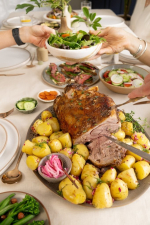The International Agency for Research on Cancer's (IARC) recent classification of red meat likely being carcinogenic could benefit New Zealand meat exports.
Lincoln's Agribusiness and Food Marketing Programme director, Nic Lees, admits the classification could be seen as a significant risk to New Zealand's red meat exports, but says this is likely not the case.
"The question needs to be asked if all red meat is created equal, as the report fails to distinguish between the consumption of beef, and lamb and other non-bovine meats.
"If we are prepared to differentiate our products as natural and healthy and not continue down the maximum production lowest cost model of the past, New Zealand could benefit."
He says a study in the International Journal of Cancer in 2012 shows that "the majority of epidemiological studies do not reveal an increased risk for colorectal cancer development in countries where well-cooked mutton/lamb and goat meat are usually consumed".
"This seems to indicate that it may be specific factors in beef that contribute to increased cancer risk and that lamb cannot be just lumped in with beef.
"Furthermore much of the red meat studies are done in countries where the beef is produced in feedlots, and fed a high carbohydrate corn diet."
Lees says significant work has been done overseas that shows the fatty acid profile and other nutritional components of grass-fed red meat is significantly different from the grain-fed product.
"New Zealand's traditional commodity focus has meant we have been reluctant to focus on aspects that may differentiate our products. New Zealand is in a unique position to differentiate our beef and lamb as healthy however this requires investment to identify the unique properties of our natural grass fed products.
"We also need to be willing to modify our production practices to deliver healthy beef, lamb and dairy products. "
Lees says a good example of this is the recent Primary Growth Partnership (PGP) targeting healthy lamb.
"Initial research showed that the right combination of feed, management and genetics could alter the fatty acid profile to produce more good fats such as Omega 3. Not only this, the meat also tasted great, scoring highly on succulence and tenderness."
He says the classification has caused considerable anxiety among meat consumers. The news was worse for processed meats that were classified as carcinogenic to humans (Group 1).
"This puts processed meat in the category of mustard gas and asbestos."











